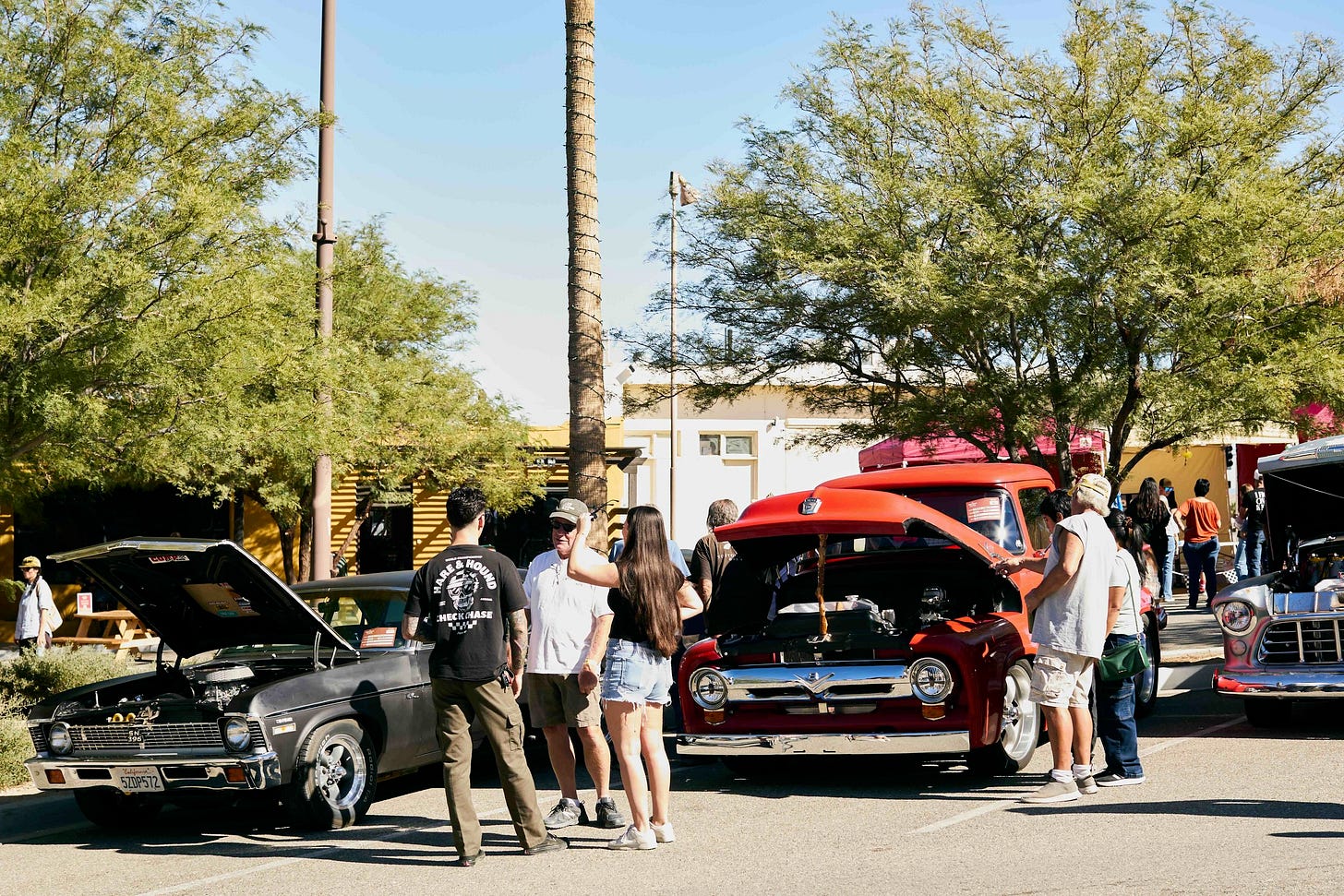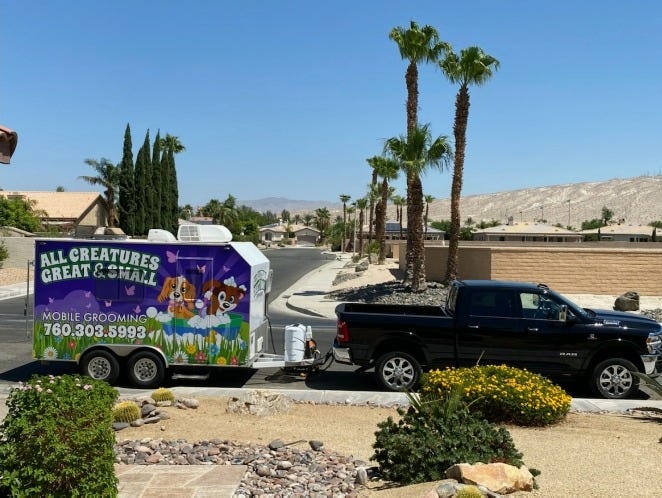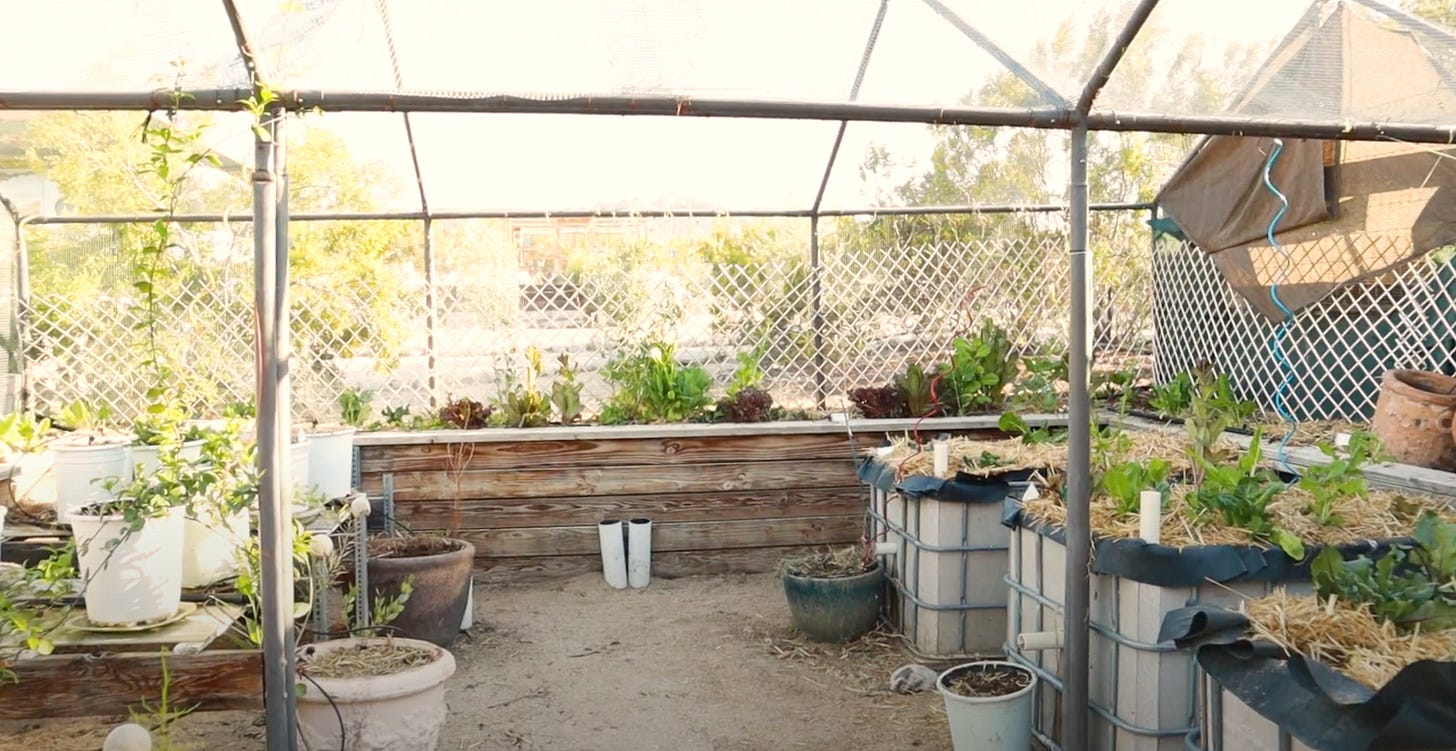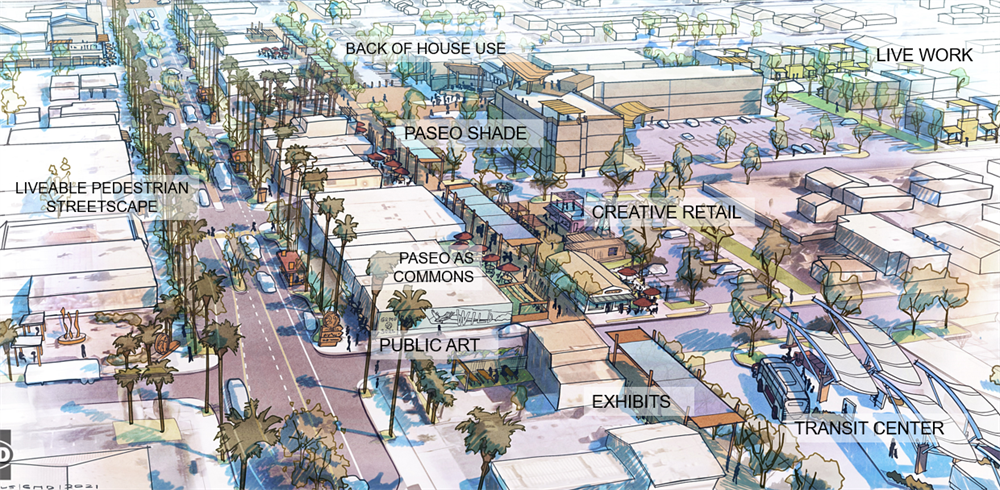ON THE AGENDA: Twentynine Palms Planning Commission, November 4, 2025
Temporary Use Permits, Smog Checks, Animal Regulations and Community Gardens return for a final discussion

Is that an echo? Temporary Use Permits, Animal Regulations, Smog Checks and Cooperative Gardens all reappear on the Planning Commission agenda as Commissioners attempt to provide final direction to staff on several items prior to the holidays and the writing of development code. It is unclear whether the Tuesday, November 4, 5 pm session will be live streamed or available on video as all items are listed as study sessions. The Community Development Director update will be given prior to the start of the study sessions.
The agenda packet is linked here.
PUBLIC COMMENTS
After Planning Commission announcements, residents can comment on items not on the agenda. Public comments on agenda items will be requested when the item is discussed. Fill out a green comment sheet for public or agenda item comments and hand it to the staff, usually sitting at the desk at the front of the room on the right side. Residents have three minutes to make your comments.
You may also email comments to Planning Commission members and Community Development Director Keith Gardner and request that comments be read at the meeting.
CONSENT CALENDAR
Approval of meeting minutes from the October 7 and October 21 meetings.
STUDY SESSION
3. Smog Check
This item was initially discussed at the October 21, 2025 meeting at the request of property owner Wendy Sundberg, who would like to use the site located at the southeast corner of Adobe Rd. and Hwy 62 as a smog check station despite that not being an allowed use in the Downtown Specific Plan. There is no proof provided in her initial letter that she has been approached by or has a preliminary agreement in place to lease to a smog check station.
The vision statement for the Downtown Specific Plan reads as follows:
Our downtown will embody a distinctly local flavor of community connections, business catalyzation and daringly creative collaboration. This urban setting will reflect our region’s confluence of diverse landscapes, people and histories as a vibrant opening act to Joshua Tree National Park and home to its visitors.
Per the staff report, “This use is not listed as permitted in the Downtown Specific Plan and it is the practice in the Community Development Department that any uses not listed in a land use district are simply not allowed.” If the City wants to encourage a tourist friendly, walkable downtown, is a smog check facility really a good fit? The staff report points out that there are already three smog check facilities in the City.
And indeed, at the October 21 meeting, Commissioner Leslie Paahana and Chair Jessica Cure cautioned about precedent: a one-off interpretation might open the door to broader auto uses downtown, potentially eroding the DG zone’s walkable, mixed-use vision. Still the Commission directed staff to shoehorn the facility into “Drive-Through Sales & Service, Non-Food (AUP),” effectively giving priority to putting an empty building to use over long-term planning. Planning staff is requesting the Commission reaffirm that direction prior to adjusting the development code.
4. Temporary Use Permits
Temporary Use Permits (TUPs) first landed on the Planning Commission agenda on September 16 with little explanation as to why the item was to be discussed. Temporary Use Permits are issued by the City and apply to a number of activities— circuses, farmers markets, outdoor crafts sales, sidewalk sales, Christmas tree lots, and “other uses not listed” such as weddings. While types of activities are listed, the zoning where these activities might occur, for instance residential versus commercial, is not. During the Community Development Director’s presentation it became clear that the study session was prompted by requests for TUPs in residential areas, as well as complaints received on activities already taking place.
A wrinkle was added on September 23, when City Council considered a request from Jimmy Brower, one of the directors of Friends of the Historic Plaza nonprofit, to allow more than 4 events per year, the current maximum under their TUP:
Ultimately, the restrictions of the current temporary use permit limiting a max of total of four events at the historic Plaza annually, regardless of applicant, does not allow this venue to breathe and grow as it has in the past and must for the future.
The request was referred to Planning, which took the issue up again at their October 7 meeting. Staff came prepared with recommendations to the Commission, including keeping the cap for residential properties at four while raising it for commercial properties to 28 events. Staff also recommended rewriting City Code to specify which type of events were allowed in which zoning types under TUPs, and to also reconsider what further permitting process is required for applicants who wish to go over their TUP event cap. As was discussed at the City Council meeting, currently sites exceeding the event cap must apply for an expensive Conditional Use Permit (CUP).
Additionally Commissioners raised the need to define “event” in order to distinguish between private parties at residences and activities needing a permit. Staff also suggested adding Administrative Use Permits (AUPs) as a new mid-tier permitting option, meant for event applicants who host series larger than accepted under TUPs, but which are still too small to justify paying for a $5,000 CUP.
Those discussions have yielded the following staff recommendations for changes to Temporary Use Permit regulations to be considered at this meeting:
For commercial or industrial zoned property, staff is proposing that events be allowed for a maximum of 28 days per year per parcel with no limit on the number of events. The Commission agreed with this change.
For residentially zoned property, a maximum of four events are allowed per calendar year. The Commission would like specific requirements included in the code to allow additional events.
Revising the code to identify which types of events will be allowed in each zoning district. The consensus of the Commission is to not be so restrictive.
Revising the code to clarify when an Administrative Use Permit would be required and when a Conditional Use Permit would be required. The Commission would like staff to create a table identifying the thresholds
Additionally a draft definition of “temporary event” is proposed as:
an activity that is temporary in nature, is open to the public, may exceed normal parking needs, may be a use that is not typically found in the land use district or is outside the normal business activity.
5. Animal Regulations

This set of recommendations for further discussion results from a study session held on September 16 in which over 20 pages of animal regulations were redlined with suggested changes. The revision is a joint project of Animal Control and the Planning Commission — accordingly Officer Rick Boyd was present to field questions. Among the topics receiving the most attention were the number of horses allowed per acre and whether home-based dog grooming services should be allowed in residential areas.
Commissioners suggested that home-based dog grooming be discussed as a part of home occupancy code instead of animal control regulations. Mobile dog grooming remains allowable under current regulations.
The study session yielded the following recommendations for discussion at this meeting:
Changing the limitation on the density of animals from zoning based to acreage based.
Remove reference to land use entitlement permits and only requiring a permit from Animal Control (for the keeping of exotic animals and dogs, cats and pigs in excess of current regulations)
Increasing the allowed number of horses in the established equestrian area (currently one horse per 1/4 acre with a minimum one acre lot to a maximum of 15 horses)
Removing the reference to home kennel /cattery, as this is not a permitted use in the City (referring to private breeding of dogs and cats).
6. Cooperative (Co-op) Gardens

Community or Cooperative Gardens have been the subject of two study sessions, held on September 16 and October 7.
Discussion of a community garden was first spurred around summer of 2024 when the City was discussing applying for an EPA grant to build a climate resiliency center. At the time, an address at 73666 Joshua Drive, a commercial building property, was listed as a potential location for this use. The proposal was quashed when the collaborating organization and purpose was changed for the grant submission, and then when the current federal administration gutted the EPA.
The current discussion appeared to be prompted by community interest in a co-op garden developed inside of a large greenhouse — would such a structure and use be allowed? Currently code is silent or ambiguous on community gardens and greenhouses. To be clear, the item to be discussed as a land use category where the garden is the primary use (as opposed to a secondary use adjacent to a building).
During the October 7 discussion, Commissioners agreed that gardens alone didn’t require special treatment in code, however the greenhouses required to maintain some nonnative plants in the desert do require regulation.
The current staff recommendation proposes that co-op gardens be allowed in any land use district subject to procedures outlined in the staff report along with a definition for a co-op garden:
A piece of land that is cultivated collectively by an established group of people or organization for noncommercial purposes. These gardens serve as shared spaces where individuals or groups come together to grow plants, vegetables, fruits and flowers. The garden is managed by the co-op members.
Also included is this summary of the consensus to date and a chart:
In what land use districts should co-op gardens be allowed? Any
Should co-op gardens be allowed as a primary use? Yes, subject to a Site Plan Review application.
What application process should be required? Commission consensus is that if it is an accessory use without a structure, then no permit required.
Should co-op gardens be subject to the same development standards as other uses? Commission requires further discussion
Should greenhouses be subject to architectural design standards? Commission consensus is no architectural review, only standard review by the Building Division.
Conclusion
Stay tuned to read which of these four agenda items proceed to the drafting of final code and eventual public hearings and which boomerang to another Planning Commission study session.
We welcome your comments! Please note that we do not allow anonymous comments. Please be sure your first and last name is on your profile prior to commenting. Anonymous comments will be deleted.
Feel free to share this article!
We are $115 away from $7000 in paid subscriptions! Who’s going to take us over $7,000? Upgrade to a paid subscription for just $5 per month or $50 per year.
Would you care to donate more than $100? Our Paypal account is up and running!




The drawing of "downtown" 29 palms looks like the same stuff I recall in college art class back in the 1960's. The only alure was.....this was where I went to buy something. Now the something is greatly delivered by vehicles. Total artificial. The carefully selected palms species and their spacing along the asphalt strip. How captivating. Indeed! I wanna buy something there. Yes sir.
Recalling the 29 Palms I first experienced in the early 90's when I moved out here, I'm inclined to think the place has been a mix of decline and influx of boringly predictable chain business; fast food and several auto parts dealers.
I don't have a solution when the buying public will drive to Home Depot to buy a few boards and negatively note while doing so the cost of using what allows them to do this; $4+ per gallon gasoline.
The fantasy downtown 29 Palms in the article is doomed.